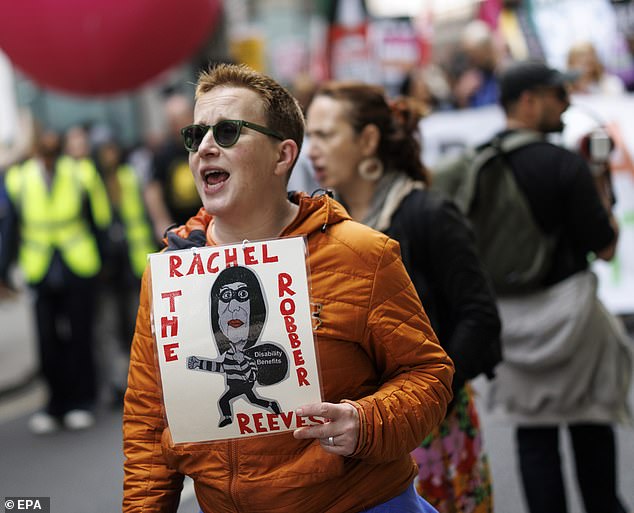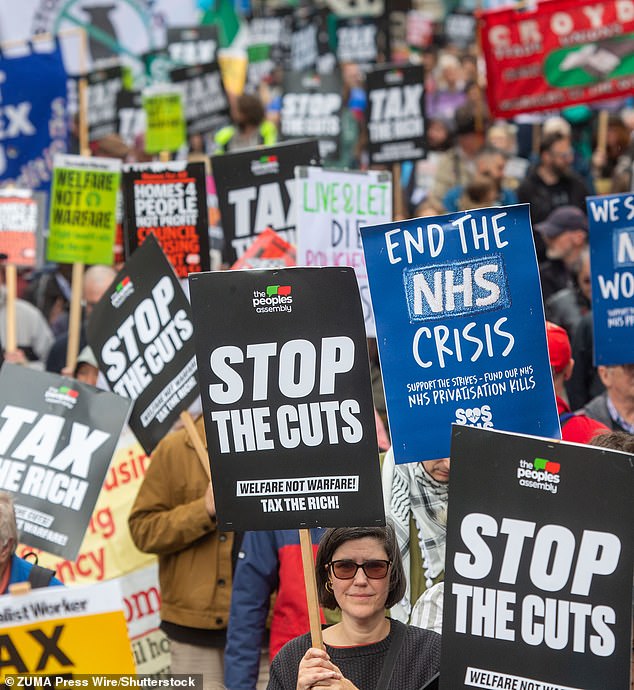We are reduced to eating the seed corn. There is no other way to describe hiking taxes when they are already at a 70-year high, when the economy is flatlining and when the Government is adding more than £100 billion a year to our national debt.
Raising taxes even further is an act of desperation. It is a way for ministers to get their hands on a chunk of revenue at the expense of maiming the private sector and, in due course, getting less revenue while impoverishing ordinary workers.
Yet it seems clear that this is what the Chancellor of the Exchequer will do tomorrow. She shows no willingness to return spending to pre-Covid levels or even to slow the growth of big budgets, particularly health and welfare.
Rachel Reeves plans to raise taxes and damn the consequences.
Which taxes? The problem she faces is that, during and after the Covid lockdowns, Rishi Sunak and Jeremy Hunt raised those taxes that do less harm to growth.
(They also, it must be said, raised some that did a great deal of harm, such as the tax on non-doms, which brought in no net revenue because it pushed so many into emigration).
The Chancellor has, in one sense, been unlucky. Normally the Conservatives inherit a deficit, turn it around and bequeath a balanced budget for Labour to blow away again.
But not this time. The pandemic meant that Labour inherited already unsustainable levels of taxation and expenditure.

Rachel Reeves plans to raise taxes even further so that ministers can get their hands on a chunk of revenue
Reeves’s response? To go on an immediate spree, giving her public-sector friends the pay rises that the Tories had refused, while simultaneously hiring more of them.
Unsurprisingly, the economy, already wheezing and spluttering, froze up. We may find, when the figures are published, that we are already in a recession. Yet Reeves seems incapable of making cuts.
Instead of shrinking the Government back towards where it was in February 2020, she will make the supposedly emergency spending occasioned by the virus structural.
How will she pay for it? This is where it gets depressing. Labour is no longer pretending to honour its promise of no tax rises beyond the three it flagged in its manifesto (VAT on schools, a retrospective levy on energy firms and a further squeeze on non-doms).
It has levied taxes across the board, especially from groups who have not traditionally voted for it, such as small business owners and farmers.
Having repeatedly promised not to tax ‘working people’, it ended up raising the one tax that falls narrowly and exclusively on people who work – namely national insurance.
So what comes next? Stand by for taxes on savings, shares, houses and possibly inheritance. These, too, will fall mainly on those whom Labour sees as class enemies.
The trouble is that they are also the most damaging to growth, because they bring in relatively little revenue while doing a great deal to deter private investment.

An anti-austerity campaigner holds a placard with an illustration of Rachel Reeves
If there really were a need for higher taxes – which, obviously, there is not – Reeves would do better to put a penny on income tax. But she has ruled that out.
Instead, we are likely to get the kinds of measures that we saw in a leaked memo by the Deputy Prime Minister, Angela Rayner: rises in stamp duty, a limit on the pension allowance, more business taxes.
Politicians think these taxes are more palatable because they are less intrusive. People won’t see them in their PAYE.
And it is true that, if more of us were aware of how much we paid when all these subtle taxes are totted up, we would be both incredulous and incandescent.
Yet it cannot be sufficiently stressed that all taxes are paid by human beings. Corporations don’t pay corporation tax any more than your TV set pays the licence fee or your car pays vehicle excise duty. It all gets passed on to you.
What, though, when even these levies turn out not to be enough?
Reeves wants to carry on splashing the cash, with especially large rises in the defence and NHS budgets. Yet we are reaching the point where we can squeeze no more out of the system.
Many of those who used to write big tax cheques have emigrated. So have a fair number of those who, while not millionaires, are entrepreneurs. In any country, a minority of people have the energy and talent to start businesses, and a lot of these people, still in their 20s and 30s, are moving to Australia or Dubai.

Protesters march through Piccadilly Circus in central London ahead of Rachel Reeves’s spending review
Of those who remain, an almost unbelievable 43,000 are quitting the workforce every month to live on various invalidity and disability allowances.
Labour could have got away, politically, with reforming the benefits system. It could have made changes that – had they come from the Tories – would have been howled down as an attempt to murder the poor.
But, when the moment came, Labour shied away from difficult decisions.
It will now pay the winter fuel allowance to pensioners on less than £35,000 – a distinction so expensive to police that the net saving will be minimal.
It has also backed away from the two-child cap on benefits, a clear signal that it will keep the cash flowing to its core supporters, come what may. We can kiss goodbye to any reform of out-of-work benefits or, indeed,
any other welfare savings. What happens when the money runs out? What happens when Reeves can’t get any more from freezing tax thresholds, limiting Isas, or raising taxes on capital gains, dividends and inheritance? What then?
Well, if she won’t cut spending and can’t borrow more, only one option remains.
She will have to grab outright at what she can.
I would not be surprised to see some sort of ‘mansion tax’, where houses over a certain value must pay the Government simply for existing.
It would doubtless be initially sold as a tax on the rich, though all such taxes end up falling on Middle England, because there are never enough rich people to pay for what governments want. Perhaps capital gains tax might end up being extended to people’s principal residences.
If houses, why not bank accounts? They, too, have the virtue of being easy targets, since the levy would be handed over by the banks themselves.
Cyprus tried it in 2013, announcing that it would help itself to a hefty one-off share of all bank accounts – 6.75 per cent on insured deposits of €100,000 or less, and 9.9 per cent on uninsured amounts above that.
Cyprus eventually backed down after a series of legal and political challenges.
But who can say for sure that a desperate Labour government might not try the same here?
One of the reasons that Cyprus dropped the idea is because its leaders understood that no one would ever invest in the kind of country that expropriates its citizens without warning.
But Labour does not seem to think that way.
Its sole motive is to hold together the coalition of public-sector workers and benefits claimants who prop it up, never mind the long-term damage to the country.
You get to eat the seed corn only once. Hungry years lie ahead.
- Lord Hannan of Kingsclere is president of the Institute for Free Trade












